Spring/Summer 2024 - Trade Highlights
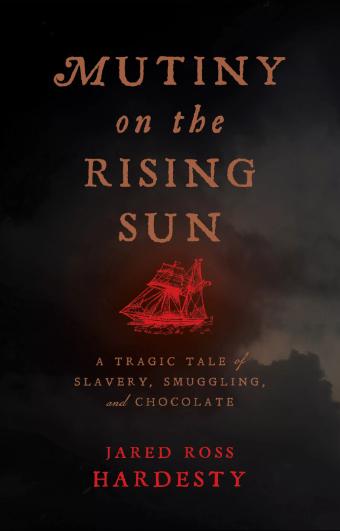

Mutiny on the Rising Sun
A Tragic Tale of Slavery, Smuggling, and Chocolate
Jared Ross Hardesty
A little-known story of mutiny and murder illustrating the centrality of smuggling and slavery in early American society
On the night of June 1, 1743, terror struck the schooner Rising Sun. After completing a routine smuggling voyage where the crew sold enslaved Africans in exchange for chocolate, sugar, and coffee in the Dutch colony of Suriname, the ship traveled eastward along the South American coast. Believing there was an opportunity to steal the lucrative cargo and make a new life for themselves, three sailors snuck below deck, murdered four people, and seized control of the vessel.
Mutiny on the Rising Sun recounts the origins, events, and eventual fate of the Rising Sun’s final smuggling voyage in vivid detail. Starting from that horrible night in June 1743, it narrates a deeply human history of smuggling, providing an incredible story of those caught in the webs spun by illicit commerce. The case generated a rich documentary record that illuminates an international chocolate smuggling ring, the lives of the crew and mutineers, and the harrowing experience of the enslaved people trafficked by the Rising Sun. Smuggling stood at the center of the lives of everyone involved with the business of the schooner. Larger forces, such as imperial trade restrictions, created the conditions for smuggling, but individual actors, often driven by raw ambition and with little regard for the consequences of their actions, designed, refined, and perpetuated this illicit commerce.
At once startling and captivating, Mutiny on the Rising Sun shows how illegal trade created demand for exotic products like chocolate, and how slavery and smuggling were integral to the development of American capitalism.
NEW YORK UNIVERSITY PRESS
1st April 2024 33 b&w images 280pp
9781479830985 £16.99 PB
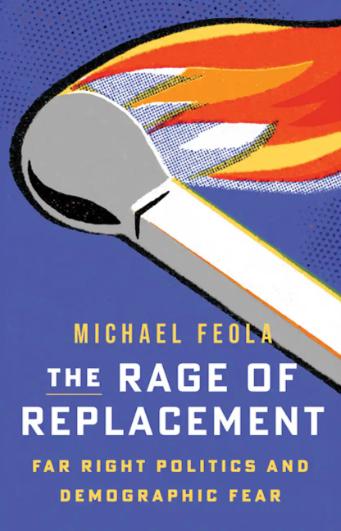

The Rage of Replacement
Far Right Politics and Demographic Fear
Michael FeolaTracing how the “Great Replacement” narrative has shaped far-right extremism and propelled its dangerous political projects and acts of violence
The “Great Replacement” narrative, which imagines that historic white majorities are being intentionally replaced through immigration policies crafted by global elites, has effectively mobilized racist, nationalist, and nativist movements in the United States and Europe. The Rage of Replacement tracks how this narrative has shaped the politics and worldview of the far right, binding its various camps into a community of rage obsessed with nostalgia for a white-supremacist past.
Showing how the replacement narrative has found significant purchase in recent mainstream discourse through the rise of Trumpism, right-wing media figures like Tucker Carlson, and events such as 2017’s “Unite the Right” rally in Charlottesville, Virginia, Michael Feola diagnoses the dangers this racist theory poses as it shapes the far-right imagination, expands through civil society, and deforms political culture. In particular, he tracks how the replacement narrative has given rise to malignant political strategies designed to “take back” the nation from its perceived enemies—by force if deemed necessary.
Identifying the Great Replacement narrative as a central force behind the rise and expansion of far-right extremism, Feola shows how it has motivated a variety of dangerous political projects in pursuit of illiberal, antidemocratic futures. From calls for the creation of segregated white ethnostates to extremist violence such as the mass shootings in Christchurch, El Paso, and Buffalo, The Rage of Replacement makes clear that replacement theory poses a dire threat to democracy and safety.
UNIVERSITY OF MINNESOTA PRESS
30th July 2024 11 b&w illus. 232pp
9781517916800 £16.99 PB
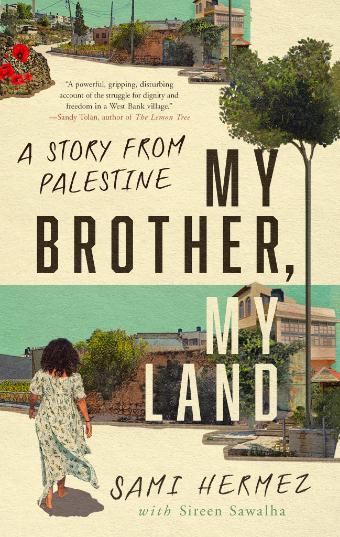

My Brother, My Land A Story from Palestine Sami Hermez
With Sireen Sawalha
"A breathtaking display of literary prowess that tells the story of an entire homeland through the frame of one woman's life. Sami Hermez expertly weaves together different perspectives and narratives, all the while handling the delicate gift of the Sawalha family story with precision and care."—Hala Alyan, author of Salt Houses
"A powerful, gripping, disturbing account of the struggle for dignity and freedom. Through a single family in a West Bank village, the entire tragic dispossession of Palestine unfolds: Israel's brutal military occupation; militant Islamic resistance; a litany of funerals where few are spared; a family scattered, with the sumud, or steadfastness, to maintain their dream of liberation."—Sandy Tolan, author of The Lemon Tree In 1967, Sireen Sawalha's mother, with her young children, walked back to Palestine against the traffic of exile. My Brother, My Land is the story of Sireen's family in the decades that followed and their lives in the Palestinian village of Kufr Ra'i. From Sireen's early life growing up in the shadow of the '67 War and her family's work as farmers caring for their land, to the involvement of her brother Iyad in armed resistance in the First and Second Intifada, Sami Hermez, with Sireen Sawalha, crafts a rich story of intertwining voices, mixing genres of oral history, memoir, and creative nonfiction.
Through the lives of the Sawalha family, and the story of Iyad's involvement in the Palestinian Islamic Jihad, Hermez confronts readers with the politics and complexities of armed resistance and the ethical tensions and contradictions that arise, as well as with the dispossession and suffocation of people living under occupation and their ordinary lives in such times.
STANFORD UNIVERSITY PRESS
13th February 2024 328pp
9781503628397 £23.99 HB


Sugar
An Ethnographic Novel
Edward Narain & Tarryn Phillips
In Suva, the bustling capital of Fiji, a tropical cyclone is looming. In this city of dazzling contradictions, three strangers are living worlds apart. Hannah is a young Australian expat who volunteers at a local health organization while leading a heady life of house parties and weekend getaways. Isikeli is a teenager from the informal settlement who has given up on his childhood dream of playing rugby and cares for his diabetic grandmother. Rishika is an IndoFijian historian who put her career on hold when she got married, only to find that her once compassionate husband has become increasingly estranged. When a brutal murder causes their worlds to collide, this unlikely trio must search for answers. Along the way, they are each forced to confront uncomfortable truths about development, its darker side, and their place within it.
Based on a combination of long-term research and lived experience, this compelling ethnographic novel reveals the hidden ways global inequality and violence play out in the developing world. Keenly observed and full of heart, Sugar is an intimate portrayal of grief, friendship, and culture clash that will prompt new ways of thinking about the world.
UNIVERSITY OF TORONTO PRESS
Series: Teaching Culture: UTP Ethnographies for the Classroom
30th March 2024 304pp
9781487554989 £18.99 PB
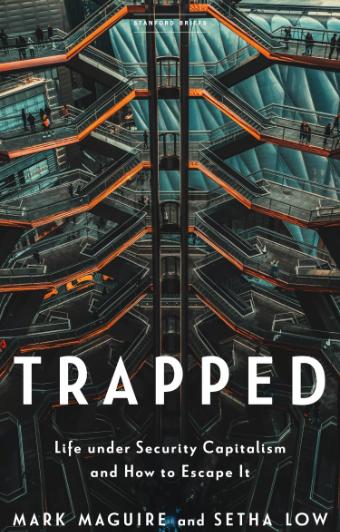

Trapped Life under Security Capitalism and How to Escape It
Mark Maguire & Setha Low
"As the US and the world experience growing threats derived from high levels of inequality and the related issues of emergent diseases and climate change, we have seen an increase in emphasis on producing security in ways that actually heighten the problem. This wellwritten and engaging book does an excellent job of analyzing these dynamics and offering an agenda for addressing them."—Alex Vitale, author of The End of Policing Exploring the pernicious influence of security capitalism on neighborhoods, airports, cities, and states.
Calls to defund the police or to stop brutal police violence, argue Mark Maguire and Setha Low, will never succeed as long as there are those who enjoy and take comfort in security capitalism. Security capitalism can be recognized by the marks it leaves on society, remaking public space in its own image—privatized, fortified, unequal, striated, and access-controlled. With a global and comparative lens that takes readers from Nairobi to New York City, Maguire and Low offer intimate portraits of the people behind security capitalism—the police, policy makers, and private contractors who agree that a price must be paid in blood to maintain public safety—and critique phenomena like the transfer of public funds to arms dealers via the militarization of police, securitized housing developments, and ineffectual counterterrorism efforts.
But more than just an exposé of the nefarious corporations, corrupt agencies, and incompetent governments, this book uniquely shines the spotlight on the ordinary citizens whose desires for safety drive these phenomena. Angela Davis has written of the challenge of persuading people that "safety, safeguarded by violence, is not really safety." Maguire and Low aid us in thinking through the challenge, providing a common language to discuss security capitalism and offering ways to escape its clutches.
STANFORD UNIVERSITY PRESS
Stanford Brief
19th March 2024 182pp
9781503632967 £11.99 PB
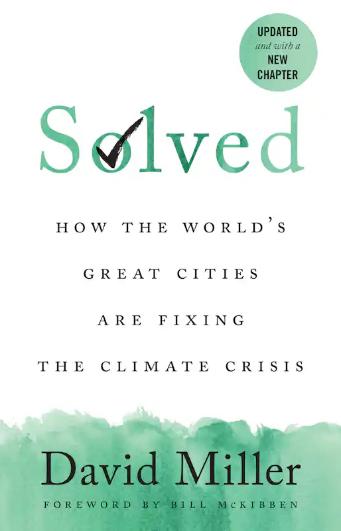

Solved How the World's Great Cities Are Fixing the Climate Crisis
David Miller
Foreword by Bill McKibben
Afterword by Anne Hidalgo
"Solved is a laudable attempt to show the power of local government and the pivotal role cities can play in protecting the environment. The power of place is rightly emphasized as a key tool in the fight for environmental preservation." —Andrew Barnfield, Eurasian Geography and Economics
"Miller’s book is a very positive perspective on the role of cities reacting to climate changes and reducing carbon emissions." —Journal of Environmental Studies and Sciences If our planet is going to survive the climate crisis, we need to act rapidly.
Taking cues from progressive cities around the world, including Los Angeles, New York, Toronto, Oslo, Shenzhen, and Sydney, this book is a summons to every city to make small but significant changes that can drastically reduce our carbon footprint. We cannot wait for national governments to agree on how to reduce greenhouse gas emissions and manage the average temperature rise to within 1.5 degrees. In Solved, David Miller argues that cities are taking action on climate change because they can – and because they must.
The updated paperback edition of Solved: How the World’s Great Cities Are Fixing the Climate Crisis demonstrates that the initiatives cities have taken to control the climate crisis can make a real difference in reducing global emissions if implemented worldwide. By chronicling the stories of how cities have taken action to meet and exceed emissions targets laid out in the Paris Agreement, Miller empowers readers to fix the climate crisis. As much a “how to” guide for policymakers as a work for concerned citizens, Solved aims to inspire hope through its clear and factual analysis of what can be done – now, today – to mitigate our harmful emissions and pave the way to a 1.5-degree world.
UNIVERSITY OF TORONTO PRESS
9th April 2024 9 b&w illus., 18 b&w figures 280pp 9781487554569 £16.99 PB
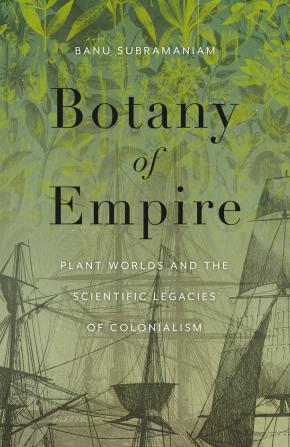

Botany of Empire Plant Worlds and the Scientific Legacies of Colonialism
Banu Subramaniam
Series edited by Banu Subramaniam & Rebecca Herzig
Colonial ambitions spawned imperial attitudes, theories, and practices that remain entrenched within botany and across the life sciences. Banu Subramaniam draws on fields as disparate as queer studies, Indigenous studies, and the biological sciences to explore the labyrinthine history of how colonialism transformed rich and complex plant worlds into biological knowledge. Botany of Empire demonstrates how botany’s foundational theories and practices were shaped and fortified in the aid of colonial rule and its extractive ambitions. We see how colonizers obliterated plant time’s deep history to create a reductionist system that imposed a Latinbased naming system, drew on the imagined sex lives of European elites to explain plant sexuality, and discussed foreign plants like foreign humans. Subramanian then pivots to imagining a more inclusive and capacious field of botany untethered and decentered from its origins in histories of racism, slavery, and colonialism. This vision harnesses the power of feminist and scientific thought to chart a course for more socially just practices of experimental biology.
A reckoning and a manifesto, Botany of Empire provides experts and general readers alike with a roadmap for transforming the colonial foundations of plant science.
UNIVERSITY OF WASHINGTON PRESS
Series: Feminist Technosciences
2nd April 2024 328pp
9780295752464 £25.99 PB
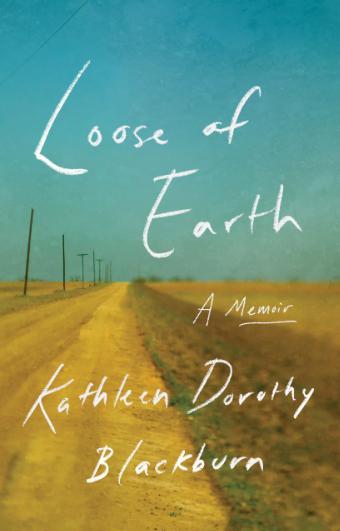

Loose of Earth A Memoir
Kathleen Dorothy Blackburn
“[A] blazing debut…[Blackburn’s] sentence-level excellence and gift for subtle characterization help this take flight. It’s a formidable portrait of the thin line between faith and delusion” — Publishers Weekly
“Loose [of] Earth is an arresting memoir about love and unbending religion, toxicity and disease, and one family’s desperate wait for a miracle that never came. Blackburn has proven herself an adept essayist, making this a release you don’t want to miss.”—Chicago Review of Books
An arresting memoir of love and unbending religion, toxicity and disease, and one family’s desperate wait for a miracle that never came.
Kathleen Dorothy Blackburn was the oldest of five children, a twelve-year-old from Lubbock, Texas, whose evangelical family eschewed public education for homeschooling, and wove improbable scientific theories into literal interpretations of the Bible. Then her father, a former air force pilot, was diagnosed with cancer at the age of thirty-eight, and, “it was like throwing gasoline on the Holy Spirit.” Stirred by her mother, the family committed to an extreme diet and sought deliverance from equally extreme sources: a traveling tent preacher, a Malaysian holy man, a local faith-healer who led services called “Miracles on 34th Street.”
What they didn’t know at the time was that their lives were entangled with a larger, less visible environmental catastrophe. Fire-fighting foams containing carcinogenic compounds had contaminated the drinking water of every military site where her father worked. Commonly referred to as “forever chemicals,” the presence of PFAS in West Texas besieged a landscape already burdened with vanishing water, taking up residence in wells and in the bloodstreams of people who lived there. An arresting portrait of the pernicious creep of decline, and a powerful cry for environmental justice, Loose of Earth captures the desperate futility and unbending religious faith that devastated a family, leaving them waiting for a miracle that would never come.
UNIVERSITY OF TEXAS PRESS
16th April 2024 216pp 9781477329627 £22.99 HB
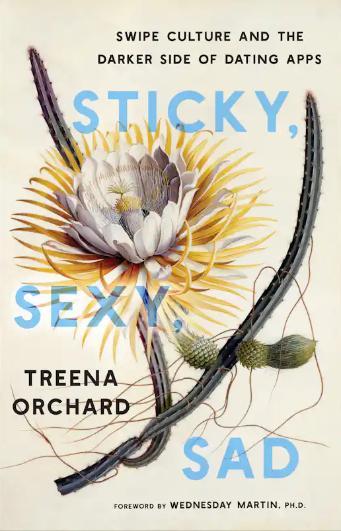

Sticky, Sexy, Sad
Swipe Culture and the Darker Side of Dating Apps
Treena Orchard
Foreword by Wednesday Martin
“In a warm, honest, and generously reflective voice, Treena Orchard writes an unconventional coming-of-age story about her journey as a single woman navigating today’s dating app culture. Her stories and insights are candid and will resonate deeply with anyone who’s ever wondered: ’What the hell am I doing on these dating apps?!’”—Joanne Orlando, author of Life Mode On: How to Feel Less Stressed, More Present and Back in Control When Using Technology
Lifelong luddite Treena Orchard was a newly sober woman coming off a muchneeded break from relationships, reluctantly taking the digital plunge by downloading a dating app. Instead of the fun, easy experiences advertised on swiping platforms, she discovered endless upkeep, ghosting, fleeting moments of sexual connection, and a steady flow of misogyny.
In Sticky, Sexy, Sad, Orchard uses her skills as both an anthropologist who studies sexuality and a sex-positive feminist to explore what it feels like to want love while also resisting the addictive pull of platforms designed to make us swipe-dependent. She asks important questions for those searching for love in the modern era: What are the social and human impacts of using dating apps? How can we maintain our integrity and warm-blooded desire for intimacy while swiping? Can we resist some of the problematic aspects of swipe culture? Is love on dating apps even possible?
Revealing how dating apps are powerful social and sexual technologies that are radically transforming sexuality, relationships, and how we think about ourselves, this remarkable book cracks the code of modern romance. Told with humor and vulnerability, Sticky, Sexy, Sad is a riveting and inspiring guide to staying true to ourselves amid the digitization of love in the twenty-first century.
UNIVERSITY OF TORONTO PRESS
30th April 2024 1 b&w table 224pp
9781487549305 £20.99 HB


The Intruder
Jean-Luc Nancy
Foreword by
Claire Denis“‘I was no longer in me’: Nancy's stunning formula states a truth that threatens every border with a knowledge of its illusory rigidity and the false homogeneity of what it would protect. Ultimately, Nancy tells us with unsettling lucidity, everybody—every body—is an intruder of itself.”—Jeff Fort, from the Introduction
“Seductive and mercurial, Nancy’s book has propagated an ecosystem of texts and images all its own—not least Claire Denis’s adaptation (adoption?), one of the crucial films of the twenty-first century. At last, the different phases of this porous encounter between philosophy and cinema are available in a single volume.”—Leo Goldsmith, film critic and programmer
In 1991, Jean-Luc Nancy's heart gave out. In one of the first such procedures in France, a stranger's heart was grafted into his body. Numerous complications followed, including more surgeries and lymphatic cancer. The procedure and illnesses he endured revealed to him, in a more visceral way than most of us ever experience, the strangeness of bodily existence itself and surviving the stranger within him.
During this same period, Europe began closing its borders to those seeking refuge from war and poverty. Alarmed at this trend and drawn to a highly intimate form of strangeness with which he had been living for years, Nancy set out in The Intruder to articulate how intrusion—whether of a body or a border—is not antithetical to one’s identity but constitutive of it.
In 2004, Claire Denis turned The Intruder into a film already hailed among the most important of our century. This edition of Nancy’s text includes Nancy’s and Denis’s accounts of turning philosophy into film and the text of a shorter collaboration between the two of them. Throughout, Nancy and Denis push us to recognize that to truly welcome strangers means a constant struggle against exoticism, enforced assimilation, and confidence in our own self-identity.
FORDHAM UNIVERSITY PRESS
7th May 2024 3 b&w illus. 96pp
9781531506186 £16.99 PB
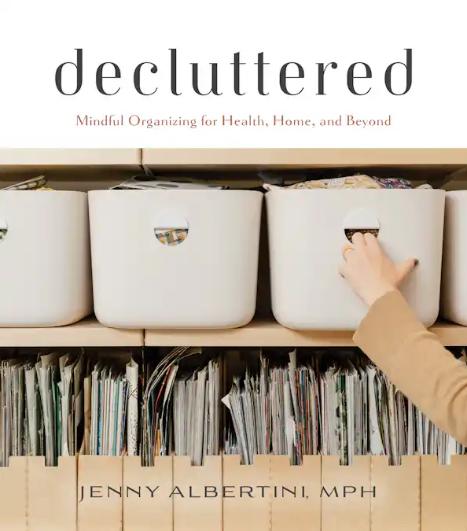

Decluttered
Mindful Organizing for Health, Home, and Beyond
Jenny Albertini
"Practical ways to incorporate decluttering as a form of daily self-care, Albertini's book offers a transformative way to simplify our lives."—Alexandra Elle, NYT Bestselling author of How We Heal
Have you ever wondered why you can't summon the energy to declutter those piles of clothes on the floor? Do you wish you knew what policies your workplace could offer so everyone can think more clearly and feel better at work? Or maybe you've felt confused about which ideas even deserve your attention right now? You're not alone. And if you are ready for a change, this book is for you.
Coming from a public health expert who spent over two decades designing health initiatives around the world, Decluttered is a mindful exploration of how and why clutter manifests in our lives–and what we can do about it. Jenny Albertini invites readers to explore decluttering from personal and empathetic angles while acknowledging how clutter does not only manifest as "stuff" in our homes, but also in our relationships and in our everyday lives.
Blending stories and science with writing prompts and creativity exercises, this book will motivate readers to examine their relationship to their surroundings while reducing clutter for their health, in their homes, in their workplaces, and beyond. Jenny shares her own transformative journey of working in clinics in Africa and training under Marie Kondo, along with inspirational moments with clients from her years as professional organizer.
Decluttered will leave its readers feeling:
•Enlightened about underlying health issues related to clutter;
•Aware of what to prioritize for their decluttering journey; and
•Ready to take tangible steps that improve their work lives, home environments, and relationships.
A refreshing addition to the well-being and home genres, Decluttered helps to reduce shame and supports readers to transform their cluttered lives and spaces into foundations for healthy, balanced and intentional living.
INDIANA UNIVERSITY PRESS
7th May 2024 39 color photos 168pp
9781684352241 £23.99 HB
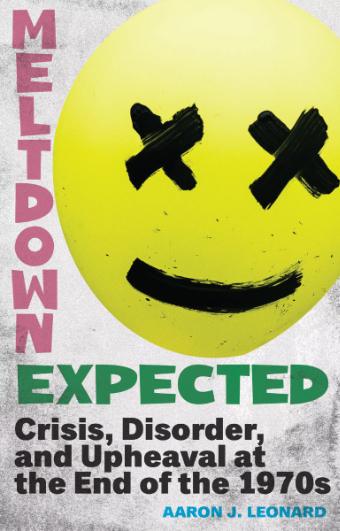

Meltdown Expected Crisis, Disorder, and Upheaval at the end of the 1970s
Aaron J. Leonard
"Historians correctly remind us that, in the 1960s, America experienced cultural and political turmoil that still resonates nearly six decades later. But in Meltdown Expected, Aaron J. Leonard proves the overlooked point that events during the last years of the 1970s were just as crucial, from Jonestown to Three Mile Island, from the rise of the Religious Right to the growing threat of violence both at home and abroad. I frankly cannot conceive of a more important book for readers who want to truly understand not only how we have gotten to where we are today, but why."—Jeff Guinn, author of The Road to Jonestown: Jim Jones and Peoples Temple
In January 1978, President Jimmy Carter proclaimed that “There is all across our land a growing sense of peace and a sense of common purpose.” Yet in the ensuing months, a series of crises disturbed that fragile sense of peace, ultimately setting the stage for Reagan’s decisive victory in 1980 and ushering in the final phase of the Cold War.
Meltdown Expected tells the story of the power shifts from late 1978 through 1979 whose repercussions are still being felt. Iran’s revolution led to a hostage crisis while neighbouring Afghanistan became the site of a proxy war between the USSR and the US, who supplied aid to Islamic mujahideen fighters that would later form the Taliban. Meanwhile, as tragedies like the Jonestown mass suicide and the assassination of Harvey Milk captured the nation’s attention, the government quietly reasserted and expanded the FBI’s intelligence powers. Drawing from recently declassified government documents and covering everything from Three Mile Island to the rise of punk rock, Aaron J. Leonard paints a vivid portrait of a tumultuous yet pivotal time in American history.
RUTGERS UNIVERSITY PRESS
17th May 2024 2 color and 12 b&w illus. 206pp
9781978836464 £23.99 HB
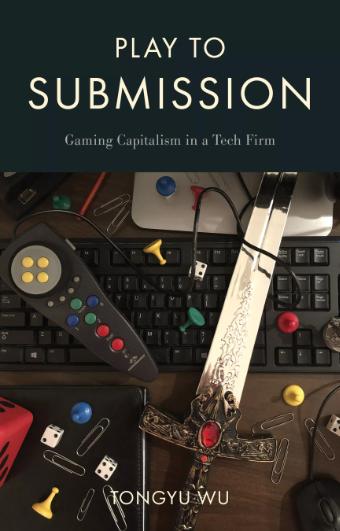

Play to Submission
Gaming Capitalism in a Tech Firm
Tongu Wu
Games are often a fun perk of a tech company job, and employees can “play to win” in the competition to succeed. But in studying “Behemoth” (a pseudonym for a top American tech company), Tongyu Wu discovered that gaming work culture was far more insidious. Play to Submission shows how Behemoth’s games undermined and manipulated workers. They lost their work-life balance and the constant competition made labor organizing difficult. Nonetheless, many workers embraced management’s games as a chance to show off their “gamer” identities and create a workplace culture with privileged insiders and exiled outsiders, with female and migrant workers usually in the latter group. Moreover, Wu indicates this may be the future of work for high- and low-skilled and, creative workers in an environment where capitalists have heightened demands for technology and creativity.
Drawing from 13 months of ethnographic work, Wu presents a persistent reality in which the company reaps the reward of surplus productivity, leaving employees themselves in a highly competitive and sometimes precarious work position.
TEMPLE UNIVERSITY PRESS
28th June 2024 238pp
9781439922989 £26.99 PB


The Rock of Arles
Richard Klein
“The Rock of Arles is an urban history we didn’t know we needed and a history we wouldn’t have known at all except through its opinionated and often very funny orographic narrator. We take seriously what the Rock tells us about the past and our possible future not despite but because of its charmingly brazen fictiveness. This delightful book thwarts expectations;its queer history is of the momentand its form entirely sui generis . . . at least until other rocks decide to follow the Rock’s example.”—Andrew Parker, Professor of French and Comparative Literature, Rutgers University
Founded 2,600 years ago on a massive limestone eminence, the city of Arles has been the home of Roman emperors and captured slaves, pagan temples and Christian spires, bloody revolutionaries and powerful papists. In The Rock of Arles Richard Klein relays the history of the city as told to him by the Rock, its genius loci, which infallibly remembers every moment of its existence, from the Roman conquest of Gaul to the fall of feudal aristocracy, from the domination of the Catholic Church to the present French representative democracy. The Rock’s contrarian and dissident history resurrects the memory of three of the city’s most radical yet largely forgotten revolutionary minds: Hellenistic philosopher Favorinus, medieval Hebrew poet Kalonymus ben Kalonymus, and subversive aristocrat Pierre-Antoine Antonelle. For the Rock, each figure represents a freethinking current running through Arlesian history which countered the reactionary, bigoted forces that governed the city for fifteen centuries. Erudite, witty, and opinionated, the Rock tells the story of Arles in order to sketch the broader canvas of European history while invoking the city’s possible future.
DUKE UNIVERSITY PRESS BOOKS
13th February 2024 16 illus. 176pp
9781478025726 £21.99 PB
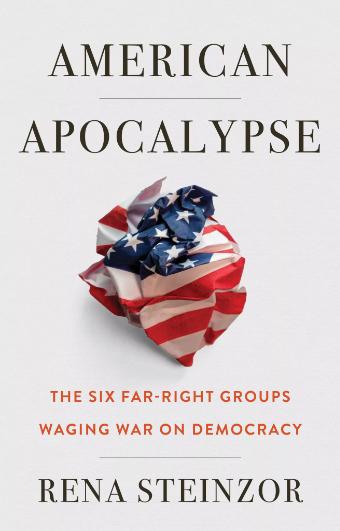

American Apocalypse
The Six Far-Right Groups Waging War on Democracy
Rena Steinzor
A thorough analysis of the right-wing interests contributing to the downfall of American democracy
The war on American democracy is at a fever pitch. Such a corrosive state of affairs did not arise spontaneously up from the people but instead was pushed, top-down, by six private sector special interest groups—big business, the House Freedom Caucus, the Federalist Society, Fox News, white evangelicals, and armed militias. In American Apocalypse Rena Steinzor argues that these groups are nothing more than well-financed armies fighting a battle of attrition against the national government, with power, money, and fame as their central motivations. The book begins at the end of Lyndon Johnson's presidency, when the modern regulatory state was born. Agencies like the Environmental Protection Agency and the Food and Drug Administration ensured that everything from our air to our medicine was safe. But efforts to thwart this "big government" agenda began swiftly, albeit in the shadows. Business leaders built a multi-billion dollar presence in the Capitol, and the rest of the six interest groups soon followed. While the groups do not coordinate their attacks, and sometimes their shortterm goals even conflict, their priorities fall within a surprisingly tight bullseye: the size and power of the administrative state. In the near-term, their campaigns will bring the crucial functions of government to a halt, which will lead to immediate suffering by the working classes, and a rapid deterioration of race relations. Over the long-term, as the prevalence of global pandemics and climate crises increase, an incapacitated national government will usher in unimaginable harm.
STANFORD UNIVERSITY PRESS
9th July 2024 344pp
9781503634596 £27.99HB
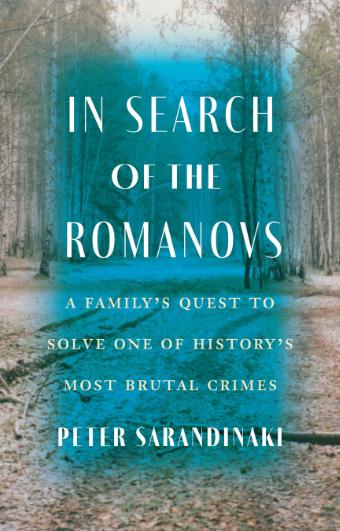

In Search of the Romanovs A Family’s Quest to Solve One of History’s Most Brutal Crimes
Peter Sarandinaki
“A remarkable family saga.”—Marilyn Swezey, historian and coeditor of The Romanovs Under House Arrest: From the Diary of a Palace Priest “Cold case murders are difficult to solve— especially when they are a century old and exist in a closed and secretive society. . . . Peter Sarandinaki navigates the labyrinth of clues, nineteenth-century maps, murder confessions, DNA, and politics to make a brilliant addition to history.”—Brook Schaub, forensic investigator and member of the SEARCH Foundation
“Interested in international history, the murder of royalty and saints, and religious intrigue? I am honored to introduce Peter Sarandinaki and his fascinating family. . . . With the leadership of a navy veteran and sea captain, the charisma of a politician, and devotion to his family and the Russian Orthodox Church, Sarandinaki is a master of navigating obstacles and barriers to any adventure.”—Clark Davenport, forensic geophysicist and founder of NecroSearch International
“Peter Sarandinaki shares his family’s incredible story of love, survival, and escape from revolutionary Russia. In this extraordinary book he combines this story with the death, secret burial, and, decades later, the discovery of skeletal remains of the family of Russia’s last emperor. Sarandinaki masterfully connects with world-renowned scientists who not only confirm the identity of the bones but finally reveal the brutality of the deaths of Nicholas II and his family, including exposing the truth about their youngest daughter, Anastasia.”—Margarita Nelipa, author, historian, and a member of the SEARCH Foundation
POTOMAC BOOKS
1st July 2024 24 photos, 3 maps, 1 appendix, index 304pp
9781640121560 £36.00 HB

